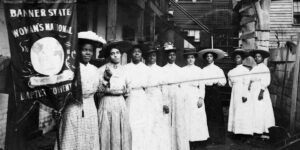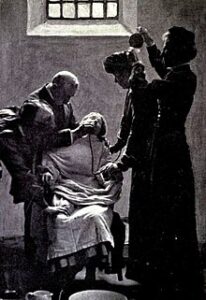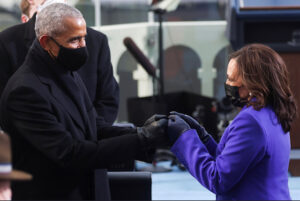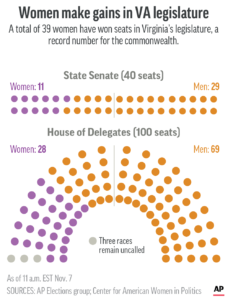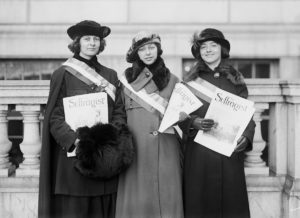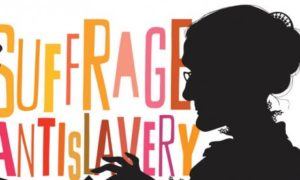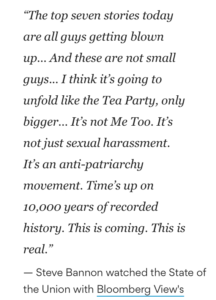Suffragettes
Marianne. 🌸
October 6, 2021Bringing to Consciousness America’s Unconscious Shadows
- Abolitionists
- Suffragettes
- Civil Rights
America is like an alcoholic home, in which no one is really saying what’s going on, the children are registering all the unprocessed realities but don’t know what to do with them, and anyone who speaks up and tells the truth is likely to be severely punished.
We can’t send the country to rehab, but we can at least try to be honest with ourselves about what’s happening. And that is no small deal. As more and more Americans bring to consciousness the unconscious shadows of our national identity, the country will begin to heal.
A lot of it is stuff we’ve all heard, but still it’s worth going over to make sure our thinking is aligned with what’s true.
In 1776, 56 men signed the Declaration of Independence, and the document was an extraordinary statement of human possibility. It was a gigantic step forward for the human race not only politically but also spiritually. For it posited the notion – what would have been considered until then a preposterous perspective – that God created all men equal.
It went on to say not only that God created all men equal, but that He had endowed all men with the “unalienable rights to life, liberty and the pursuit of happiness.” The very idea of human equality had never before been codified in the founding documents of any nation on earth.
Centuries of nations ruled by the notion of the “divine right of Kings” was overthrown by a bunch of young radicals in the American colonies. All the men who signed the document were risking their lives by doing so, for if the British won the war then they would be hanged as traitors against the King of England.
That was the beginning … and yet there was a glitch. A quite terrible glitch. For of the 56 signers of the Declaration of Independence, 41 of them were slaveowners. Slaves had first been brought to the American colonies in 1619, and slavery would not be abolished as in institution until 1865. Even then, it was still legally allowed within a prison system that took full advantage of the loophole to enslave African American men. And the 13th Amendment, passed in 1865, was followed by another hundred years of institutionalized slavery against Blacks in America.
What all of that means then, is that from the very beginning of our country we have embodied a terrible split between the highest aspirations of humanity on one hand, and our lowest, meanest impulses on the other. Our national ideals are highly enlightened, whereas in every generation since the days of our founding we have lived out an often violent struggle between those who would stand, sacrifice and even die for those ideals, and those who would transgress against them.
Would our commitment to equality mean only white people, by not Black? Only Caucasians, but not Native Americans? Only men, but not women? Only Christians, but not Jews, Hindus, Muslims and others? Only straight and cisgender people, but not LGBTG? And the list goes on. Today, it also means – as much as it has at any time in our history – only the rich, but not the poor?
While the struggle has been embodied by every generation, over time we have tended to self-correct. Slavery was met by Abolition, institutionalized oppression of women was met by the Women’s Suffragette Movement, and segregation in the American South was met by the civil rights movement. Our legacy as Americans includes some terrible forms of oppression – from slavery to the genocide of Native Americans – but it also includes tremendous movements to push back and to ultimately defeat even the worst forms of tyranny. We have as much to be proud of in our past, as to be ashamed of.
But the most important thing, is that it’s our turn now. Today’s oppression is not encapsulated in specific institutionalized identities such as slavery or segregation or the lack of women’s suffrage. Those could be compared to operable tumors that could be surgically removed. Rather, it is more like a cancer that has metastasized and is wrapped around healthy organs, sucking from them their very life force. The new American aristocracy is the same in principle as it has always been – in the words of Thomas Jefferson, “It is the general tendency of the rich to prey upon the poor” – yet it has morphed into something new: the economic tyranny of a shadowy, predatory form of capitalism that has injected itself into every fiber of American life. Worst of all – with the obscene and unlimited flow of dark money in our politics – it now holds our government hostage, turning all three branches of government from our last defense against capitalist overreach into the very handmaiden of our corporate overlords.
American capitalism has gone off the rails, its most predatory form like a soulless force now lording over us. Our food, water and air are filled with toxins …so that stockholders can get rich. Our planet is being destroyed … so that stockholders can get rich. Millions lack health care… so that stockholders can get rich. We fight wars around the world… so that stockholders can get rich. Millions work for starvation wages and unions are busted … so that stockholders can rich. And the list goes on. There seems to be no end in sight to the corporate tyranny that now plagues us.
Will we be the first generation to wimp out on pushing back the forces that would damage our lives and limit our future? I believe not. I know how bad things look right now, but hope is a moral imperative and cynicism is just an excuse for not helping. Having run for office myself, I’ve seen up close the goodness and intelligence of the American people. The more we understand, and the more we’re willing to stand on what we know, the more power we will have to overcome.
Abolition emerged from the early Evangelicals in New Hampshire. Many of the leaders of the Women Suffragette movement were Quakers. And Dr. King was a Baptist preacher.
Throughout our history, we have found the power to override even the most oppressive forces through political activism that was fueled by spiritual fortitude. The marriage of the two is emerging once again. I can feel it in my bones.
A glass ceiling broken.
January 20, 2021‘And with the silence of stars I enfold your cities made by time.’
-Rilke
From our young Los Angeles poet laureate:
“Here’s to the women who have climbed my hills before.”
The text of 22-year-old Amanda Gorman’s poem, “The Hill We Climb,” in full.
When day comes, we ask ourselves, where can we find light in this never-ending shade?
The loss we carry. A sea we must wade.
We braved the belly of the beast.
We’ve learned that quiet isn’t always peace, and the norms and notions of what “just” is isn’t always justice.
And yet the dawn is ours before we knew it.
Somehow we do it.
Somehow we weathered and witnessed a nation that isn’t broken, but simply unfinished.
We, the successors of a country and a time where a skinny Black girl descended from slaves and raised by a single mother can dream of becoming president, only to find herself reciting for one.
And, yes, we are far from polished, far from pristine, but that doesn’t mean we are striving to form a union that is perfect.
We are striving to forge our union with purpose.
To compose a country committed to all cultures, colors, characters and conditions of man.
And so we lift our gaze, not to what stands between us, but what stands before us.
We close the divide because we know to put our future first, we must first put our differences aside.
We lay down our arms so we can reach out our arms to one another.
We seek harm to none and harmony for all.
Let the globe, if nothing else, say this is true.
That even as we grieved, we grew.
That even as we hurt, we hoped.
That even as we tired, we tried.
That we’ll forever be tied together, victorious.
Not because we will never again know defeat, but because we will never again sow division.
Scripture tells us to envision that everyone shall sit under their own vine and fig tree, and no one shall make them afraid.
If we’re to live up to our own time, then victory won’t lie in the blade, but in all the bridges we’ve made.
That is the promise to glade, the hill we climb, if only we dare.
It’s because being American is more than a pride we inherit.
It’s the past we step into and how we repair it.
We’ve seen a force that would shatter our nation, rather than share it.
Would destroy our country if it meant delaying democracy.
And this effort very nearly succeeded.
But while democracy can be periodically delayed, it can never be permanently defeated.
In this truth, in this faith we trust, for while we have our eyes on the future, history has its eyes on us.
This is the era of just redemption.
We feared at its inception.
We did not feel prepared to be the heirs of such a terrifying hour.
But within it we found the power to author a new chapter, to offer hope and laughter to ourselves.
So, while once we asked, how could we possibly prevail over catastrophe, now we assert, how could catastrophe possibly prevail over us?
We will not march back to what was, but move to what shall be: a country that is bruised but whole, benevolent but bold, fierce and free.
We will not be turned around or interrupted by intimidation because we know our inaction and inertia will be the inheritance of the next generation, become the future.
Our blunders become their burdens.
But one thing is certain.
If we merge mercy with might, and might with right, then love becomes our legacy and change our children’s birthright.
So let us leave behind a country better than the one we were left.
Every breath from my bronze-pounded chest, we will raise this wounded world into a wondrous one.
We will rise from the golden hills of the West.
We will rise from the windswept Northeast where our forefathers first realized revolution.
We will rise from the lake-rimmed cities of the Midwestern states.
We will rise from the sun-baked South.
We will rebuild, reconcile, and recover.
And every known nook of our nation and every corner called our country, our people diverse and beautiful, will emerge battered and beautiful.
When day comes, we step out of the shade of flame and unafraid.
The new dawn balloons as we free it.
For there is always light, if only we’re brave enough to see it.
If only we’re brave enough to be it.
“With malice toward none, with charity for all, with firmness in the right as God gives us to see the right, let us strive on to finish the work we are in, to bind up the nation’s wounds, to care for him who shall have borne the battle and for his widow and his orphan, to do all which may achieve and cherish a just and lasting peace among ourselves with all nations.”
Abraham Lincoln’s second inaugural address, Saturday, March 4, 1865
“The great privilege of the Americans does not simply consist in their being more enlightened than other nations, but in their being able to repair the faults they may commit.”
-Alexis Tocqueville, Democracy in America, 1835, Beinecke Library, Yale
Masha Gessen, The New Yorker:
‘Both times the poem (Amanda Gorman) raises “democracy,” Gorman pairs the word with “delay,” which tells us that democracy is a thing expected, anticipated—not a thing that we have built, or possessed, but a dream. This is not the way that politicians or even political theorists usually use the word “democracy,” but it is one way that philosophers have used it. Jacques Derrida, the French deconstructionist, used the term “democracy to come.” Democracy, he wrote, was always forged and threatened by contradictory forces and thus is always “deferred,” always out of reach even in societies that adopt democracy as their governing principle.’
My take away from President Biden’s inaugural speech today:
Recent weeks and months have taught us a painful lesson. There is truth and there are lies, lies told for power and for profit. And each of us has a duty and responsibility, as citizens, as Americans, and especially as leaders, leaders who have pledged to honor our Constitution and protect our nation, to defend the truth and defeat the lies.
“So now what do we do? We don’t forget, we remember EVERYTHING that has brought us to this moment.”
Brook Gladstone, On The Media
Amen.
100 Years.
March 12, 2020The local celebration actually started during Hailey’s Fourth of July Parade.
#WomenVote
STORY AND PHOTO BY KAREN BOSSICK
‘The Idaho Women’s 100 Kickoff Event will take place at noon Friday, March 13, in downtown Hailey. Another will take place in Ketchum at the same time.
The event commemorates the 100th anniversary of the passing of the 19th Amendment to the U.S. Constitution, giving most women in America the right to vote.
The Ketchum event will start at noon at Ketchum Town Square.
Hailey’s event will also start at noon. Participants will gather in front of the Hailey Public Library and march to the Old County Courthouse where a Governor’s Proclamation celebrating Idaho Women’s Day will be read.
Speakers will also speak to the occasion.
At 12:30 p.m. participants will ring bells, including the large bell at Emmanuel Episcopal Church. The bell ringing is a symbolic gesture that unites all Idahoans in commemorating the right of women to vote.
“This is a big day for our country and for all the women who make it great,” said organizer Bob McLeod, president of the Blaine County Historical Museum. “We hope everyone takes a moment to join us in ringing a bell to celebrate.”
Numerous events commemorating the passage of the 19th Amendment will be held around the state during 2020, organized by the Idaho Women in Leadership and the Idaho State Historical Society. Among them exhibits on Idaho’s “First, First Family” and “Miss Fletcher’s Botany Expedition” in the Idaho State Capitol.
Questions? Call the library at 208-788-2036 or the museum at 208-788-1801.’
If you attend, please remember pandemic social distancing guidelines and keep three feet apart from each other. -dayle
https://eyeonsunvalley.com/Story_Reader/7037/Ring-a-Bell-to-Celebrate-Women’s-Right-to-Vote/
Women: The Most Powerful Electorate
November 11, 2019“Never forget that it only takes one political, economic or religious crisis for women’s rights to be put in jeopardy. Those rights are never to be taken for granted; you must remain vigilant throughout your life.”
-Simone de Beauvoir
AXIOS
A surge of female winners in this week’s state elections — most of them Democrats, and many of them women of color — reflected women’s rising power since the 2016 election, AP’s Sarah Rankin and Sara Burnett report.
In Virginia, Juli Briskman, a cyclist who was fired after she flipped off President Trump’s motorcade, was elected to the Loudoun County Board of Supervisors, representing an area that’s home to one of his golf courses.
In Maine, a 23-year-old Somali American woman was elected to the Lewiston City Council, defeating another Democrat and what she described as “internet trolls” who lobbed racist and sexist attacks via social media.
|
APTuesday was an extension of the blue wave in 2017, when Democrats picked up 15 Virginia House seats, with 11 won by women. The next year, three women in the state defeated incumbent Republicans in the U.S. House. One of those women, Rep. Abigail Spanberger, said the campaigns in Virginia haven’t just been won by women, but they’ve also been powered by female volunteers and animated by issues women prioritize — such as gun violence prevention and health care. Spanberger read Tuesday’s results as evidence of the success of centrist, pragmatic politics. She advised Democrats with national ambition to “pay attention.” “People want us to act, to focus on solving problems, not be the most ideologically pure,” she said. “People are not expecting perfection. But they are expecting you to try.” DT’s approval rating among women has been lower than with men throughout his presidency. Pew Research Center data shows DT’s average approval rating over his first two years in office was 44% among men, compared with 31% among women, a gap in presidential approval wider than for other recent presidents, including Barack Obama, George W. Bush, Bill Clinton and George H.W. Bush. “(Women have) just decided, ‘OK, if someone like this can get elected, something is very, very wrong, and we need to start speaking up and changing it.’” |
1918: ‘That which for us is yet sight, not touch.’
November 7, 2018And I dreamed a dream.
I dreamed I saw a land. And on the hills walked brave women and brave men, hand in hand. And they looked into each other’s eyes, and they were not afraid.
And I saw the women also hold each other’s hands.
And I said to him beside me, “What place is this?”
And he said, “This is heaven.”
And I said, “Where is it?”
And he answered, “On earth.”
And I said, “When shall these things be?”
And he answered, “In the future.”
~Olive Schreiner
Dedicated to the women of Nov. 6, 2018
A valentine to Elizabeth and Susan.
February 14, 2018Remembering their earlier struggles, Anthony closed her letter: “And we, dear old friend, shall move on the next sphere of existence—higher and larger, we cannot fail to believe, and one where women will not be placed in an inferior position, but will be welcomed on a plane of perfect intellectual and spiritual equality.” The sentiment was timelier than anyone expected. Stanton, who had been homebound and in ill health but still publishing commentaries, died before the letter was published on October 26, 1902, two-and-a-half weeks before her birthday.
In her letter, Anthony sounds optimistic, despite her lament that only in death will they experience equality. She seems confident in the suffrage movement’s new leaders. There is a sense that things can only move forward for women.
-Humanities Magazine, by Katy June-Friesen, Volume 35, Number 4



